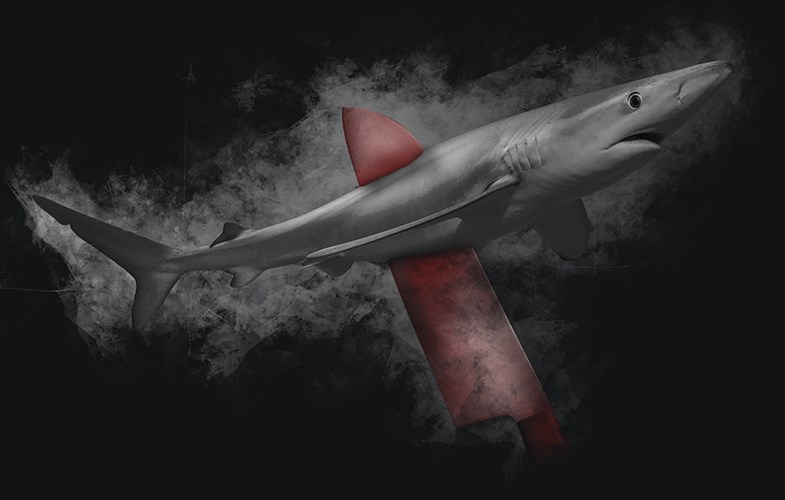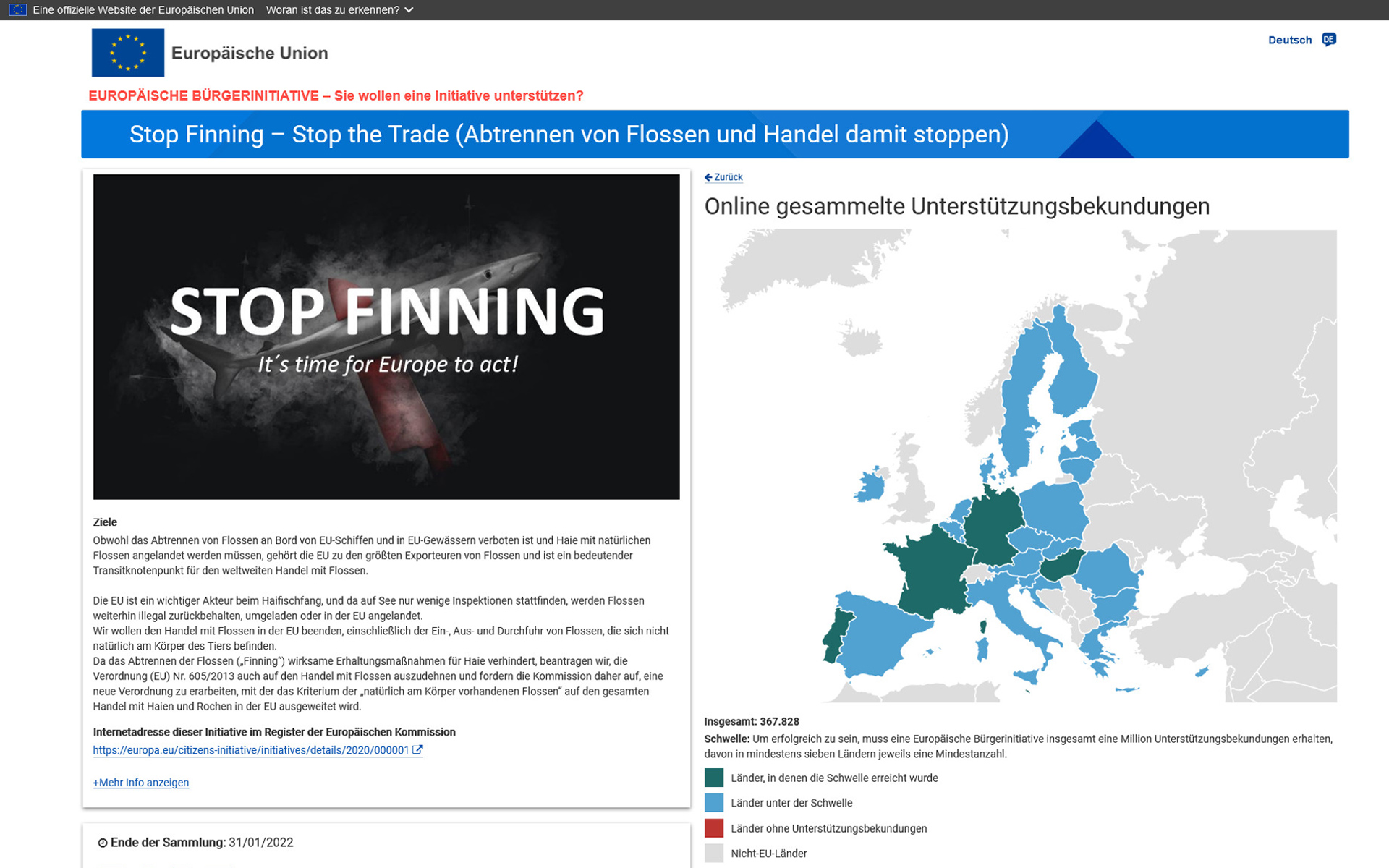

Supporter of the EU Citizens' Initiative
EU Citizens' Initiative: Stop Finning - Stop the Trade
Every year, between 63 and 273 million sharks die from fishing. This figure is probably underestimated due to the lack of reliable data and the extremely high number of unreported cases of illegal fishing worldwide.
Sharks are hunted worldwide, mainly for their fins. These are consumed as shark fin soup, especially in Asia. You can pay up to 90 € for this supposed delicacy, which contains only a few grams of fins. A lucrative business with huge profit margins at the expense of the sharks!
The lucrative business with shark fins is also driven by Europe, as a major supplier of shark fins to the markets in Southeast Asia. Since 2013, the European Union requires all sharks to be landed with all "Fins Naturally Attached" thereby prohibiting the retention, transhipment and landing of detached shark fins in EU waters and by all EU vessels, without exceptions. The fins must remain naturally attached to the carcass of the animal up to the point of first landing. Fins can then be separated from the animal and exported as detached or loose fins, mainly to Southeast Asia. In 2016 alone, Spain reported landings of 53,000 tons of blue shark from the Atlantic, equivalent to about 1.75 million animals. Despite the increasingly threatened state of many shark populations, the total catch of blue sharks in the Atlantic, has almost doubled since the beginning of the millennium. Besides targeting blue sharks (Prionace glauca), the shark species, which is globally most heavily fished in all oceans, the EU fleet also targets shortfin mako (Isurus oxyrinchus) sharks in the Pacific and in the Indian Ocean, where this globally endangered shark species remains without any protection and can be caught without limits.
For the North Atlantic a retention ban for shortfin mako has been defined until 2024 and the EU’s Scientific Review Group (SRG) has also agreed on a negative opinion for the South Atlantic thus prohibiting the trade of this CITES App II listed species in the EU. However, despite all of this the fishing induced mortality remains far too high in the North Atlantic, hindering this overfished stock to rebuild until 2070, as the EU fleet continues discarding mako sharks mostly dead, while other fishing nations such as Canada and USA have already increased the ratio of live releases to 70% and 60% respectively
The shark fishing operation is very profitable but mostly because of the value of the fins. On average, almost 3,500 tons of fins with a total value of around 52 million euros are exported from the EU every year. Due to few inspections in EU ports and only sporadic inspections of fishing vessels at sea, combined with the absence of any inspections in ports outside of EU, finning continues in many areas and especially in the High Seas. No one can say for sure how many shark fins are still illegally landed also in Europe or imported into the EU.. Only very few countries have passed a "Fins Naturally Attached" legislation (e.g. USA, UK, Canada, India, South Africa) while most other countries and all of the large tuna RFMOs continue to allow a fin to carcass ration of detached fins being on board and landed as detached fins and even finning remains being allowed or at least tolerated in several countries. Therefore, of the origin and legality of the majority of fins being traded globally is hard to trace, but nevertheless detached fins can legally be imported or transiting the EU.
And in many instances this also includes fins of CITES App II listed species which are illegally traded without the required export permits and in praxis impossible to detect in midst of thousands of other fins, packaged dried, frozen or chemically treated as loos fins of all sizes in hundreds of boxes as part of a cargo; an impossible task to achieve even for the most experienced customs officers and even if having access to modern DNA analysis testing that can identify each fin down to the species level, via a time consuming and expensive test.
For more details on the background and the truth behind the allegedly sustainable and well managed EU shark fisheries, that operate in all oceans with a small but extremely efficient fleet of longliners, read our background information provided to the EU Commission in support of the demand of the European Citizen’s Initiative:
That is why we demand: The trade of shark fins in Europe must be stopped immediately! The barbaric practice of finning and the unsustainable exploitation of shark populations can only be stopped when trade regulations make this trade financially unviable. The exports, import and transit of detached fins of sharks and rays must be prohibited. It is time for Europe to finally act consistently to protect sharks and our oceans!
Background
Europe is also involved in this trade, whether by catching and processing sharks itself or as a central transshipment point for fins from around the world.
Voluntary measures to restrict fishing are not to be expected. On the contrary, demand for the coveted fins is increasing. And where there is demand, there is profit.
The only viable option lies in appropriate legislation. The first steps in this direction have already been taken in the EU since 2013. The "Fins Naturally Attached" regulation prohibits the storage, transhipment and landing of any loose shark fins on EU vessels. This should ban the cruel practice of shark finning and achieve a general decrease in European shark fishing.
The reality, however, is different. Although there was a brief decline in catches, the targeted marketing of shark meat quickly brought them back to their original levels. As soon as the animals are landed, they can still legally have their fins removed. And as long as this and the trade in loose fins is allowed, Europe will continue to be one of the main transshipment centres.
There is also the problem of illegal trade in CITES species in Europe. Without genetic analyses it is almost impossible to determine the exact species.
Goal
- Initiate and support the development and adoption of EU legislation for a ban on the import, transit and export of detached fins of all sharks and rays.
Duration
As long as it takes to ban this unsustainable and socioeconomically unjust trade in Europe and EU following the example of UK, USA, Canada and other that have already taken this step towards better shark conservation.
After a public hearing in the EU Parliament in March 2023, the EU Commission must answer by July 11, 2023.
Based on the answer we will continue to support the call and ensure that the demand of 1.1 Mio EU Citizen’s will be heard and that the preparatory groundwork for respective legislation to implement a fin trade ban for detached fins in the EU will be progressed.
Links
Official page of the EU of the campaign:
https://europa.eu/citizens-initiative/initiatives/details/2020/000001_en
https://oceana.org/wp-content/uploads/sites/18/2022/11/oceana_blueshark_summary_dec2022.pdf
Blog:
Europe Calling to Save Sharks: Will the EU listen to the Request of its Citizens?
Documents:

© Europäische Union - Portal
The EU Citizens’ Initiative
Since 2012, EU citizens can personally get involved in shaping European legislation. Through an EU Citizens' Initiative, they can directly address the European Commission to propose legislative changes.
First, an organizers' group of at least seven EU citizens residing in seven different EU countries is established. This group then registers the initiative for the proposed legislative changes with the European Commission. Not every initiative is accepted because specific contextual and formal requirements have to be met.
As soon as the Commission gives the green light, the collection of signatures can begin. At least 1 million eligible signatures must be obtained within one year. All EU citizens who are old enough to vote in European elections are eligible to sign. In Germany, the minimum age is 18 years old, in Austria 16 years old.
Signatures can be registered either online directly with the EU Commission or on paper. The initiative is eventually submitted if the minimum number is reached within the deadline (and these votes stand up to scrutiny). In the next step, representatives of the organizing group present the issue to the European Parliament in a public hearing.
At the latest six months after submitting the final count, the Commission must announce its further action or rejection of the proposed legislative amendment. If the decision is favourable, the initiative may go through the relevant legislative procedure and changes are made to the laws.
Project history
02/01/2020 - Registered
Commission registration number: ECI(2020)000001
31/01/2020- Start of the collection period
New end date for collection in line with Regulation (EU) 2020/1042, Decision C(2020) 9226 and Decision C(2021) 1121
31/01/2022- 1.202.121 votes collected
21/10/22 - 1.119.996 verified votes
11/01/2023- Submissionof the votes
06/02/2023- meeting with delegates of European Commission
27/03/2023- Open hearing at the European Parliament
23.06.2023 - Open letter with our demands to the EU Commission
11.07.2023 - Official response from the EU Commission
